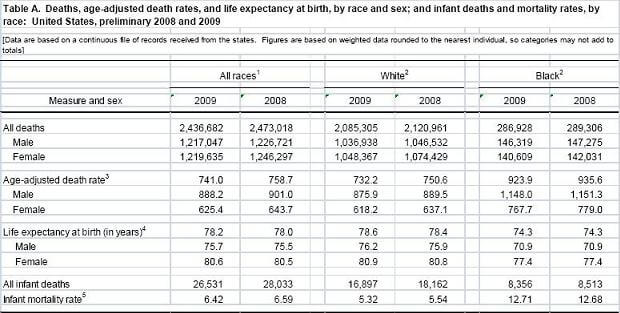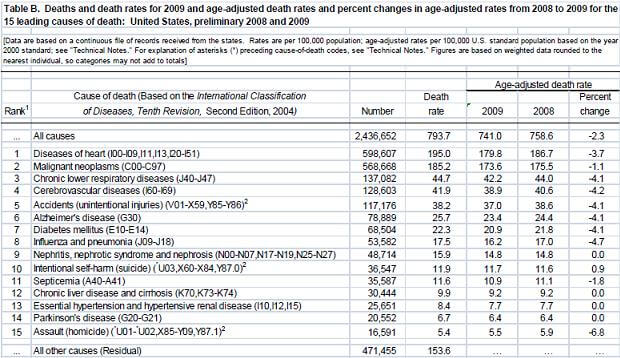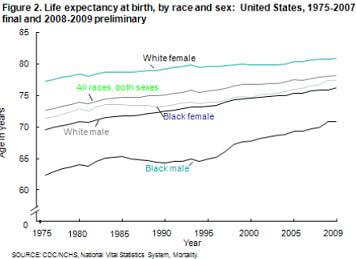
A new record high in US life expectancy raises the question, what will your children do with 0.2 more years of living? Well, that’s not exactly how life expectancy works, but it’s still a time to celebrate! Preliminary data from the National Vital Statistics System (part of the National Center for Health Stats and the CDC), shows that the average life expectancy at birth in 2009 was 78.2 – that’s a significant jump ahead of 2008’s 78.0. While these statistics tell us that a child born in 2009 has a good chance of living into their seventies, here at the Hub we think the real expectancy should be a hundred years more than that as upcoming technologies will continue to boost lifespans, as we fight illness, poverty, and hunger. For now, the National Vital Statistics System report shows us what progress we’ve already made. 10 of the 15 top causes of death are dropping, infant mortality is falling, and most age groups are doing better as well. Statistically speaking, it’s a great time to be alive. And it’s only going to get better. Woohoo!
The NVSS report collects data from death certificates through the United States to build its report. Information in the 2009 report is still preliminary, but the NVSS has a good record of getting very close with these early estimates. While the biggest news is definitely the new record high life expectancy at birth of 78.2, the report also found other encouraging trends:
- The age-adjusted death rate for heart diseases fell 3.7%
- The age-adjusted death rate for cancer fell 1.1%
- The age adjusted death rate for alzheimer’s fell 4.1%
- The age adjusted death rate for homicide fell a whopping 6.8%!
- Infant mortality is down 2.6%, from 6.59 per thousand in 2008 to 6.42 per thousand in 2009.
- While the life expectancy of those over 75 didn’t improve, every other age group saw an increase of 0.1 years.


We should probably take these glad tidings as evidence that general trends in health have improved, but this is no time to rest on our laurels. While heart disease and cancer declined, they still account for an unforgivable 48% of deaths in the US. Let’s also not forget that these improvements reflect averages across the population and aren’t enjoyed equally by all. White females, your expectancy is a luxurious 80.9, rising every year. Black males, holding steady at just 70.9. People in West Virginia have significantly higher age-adjusted death rates than those in Hawaii (949 per 100k vs. 619 per 100k). We are living longer, but some chronic and health impairing diseases, such as diabetes, are on the rise. The basics of longevity – eating well, exercising daily, and countering stress with meaningful social bonds – are too often forgotten. Even with the recent increase, the US remains behind most other industrialized nations in life expectancy. We’re doing better, but we still have tons of room to improve!

While the causes of death are many, and the factors behind its variation complex, it is reassuring to see that there are many emergent technologies that may help us not only live longer, but healthier as well. We’re getting closer to being able to grow new organs to replace faulty ones, whether their damage comes from genetics or our own malfeasance. Or perhaps we’ll augment our organs with machines, letting cybernetics extend our lives and expand our capabilities. Our ability to detect cancer is improving, and we soon may be able to scan ourselves quickly, cheaply, and every day. Stem cells, genetics, data analysis – we continually see advances on Singularity Hub that could help us in the decades ahead. Not just in the US, mind you. There are institutions dedicated to taking all these emerging forms of technology and using them to help the billions in the developing world. Other groups are struggling to find the root causes of aging, and extend not just life expectancy, but our maximum lifespan as well. As we struggle to find ways to improve the longevity and health of everyone on the planet, we need to keep in mind that small victories and new challenges go hand in hand.
For now though, I’m just going to sit back and celebrate. 0.2 years…73 whole new days of life…I think I’d learn how to bungee jump.
[image credits: Tim Bailey via Wylio (mod), National Vital Statistics System Preliminary Report]
[source: National Vital Statistics System Preliminary Report]


